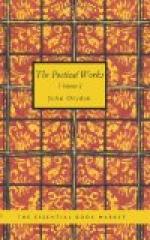* * * * *
Of all our antic sights and pageantry,
Which English idiots run in crowds to
see,
The Polish[80] Medal bears the prize alone:
A monster, more the favourite of the town
Than either fairs or theatres have shown.
Never did art so well with nature strive;
Nor ever idol seem’d so much alive:
So like the man; so golden to the sight,
So base within, so counterfeit and light.
One side is fill’d with title and
with face; 10
And, lest the king should want a regal
place,
On the reverse, a tower the town surveys;
O’er which our mounting sun his
beams displays.
The word, pronounced aloud by shrieval
voice,
Laetamur, which, in Polish, is rejoice.
The day, month, year, to the great act
are join’d:
And a new canting holiday design’d.
Five days he sate, for every cast and
look—
Four more than God to finish Adam took.
But who can tell what essence angels are,
20
Or how long Heaven was making Lucifer?
Oh, could the style that copied every
grace,
And plough’d such furrows for an
eunuch face,
Could it have form’d his ever-changing
will,
The various piece had tired the graver’s
skill!
A martial hero first, with early care,
Blown, like a pigmy by the winds, to war.
A beardless chief, a rebel, e’er
a man:
So young his hatred to his prince began.
Next this (how wildly will ambition steer!)
30
A vermin wriggling in the usurper’s
ear.
Bartering his venal wit for sums of gold,
He cast himself into the saint-like mould;
Groan’d, sigh’d, and pray’d,
while godliness was gain—
The loudest bagpipe of the squeaking train.
But, as ’tis hard to cheat a juggler’s
eyes,
His open lewdness he could ne’er
disguise.
There split the saint: for hypocritic
zeal
Allows no sins but those it can conceal.
Whoring to scandal gives too large a scope:
40
Saints must not trade; but they may interlope:
The ungodly principle was all the same;
But a gross cheat betrays his partner’s
game.
Besides, their pace was formal, grave,
and slack;
His nimble wit outran the heavy pack.
Yet still he found his fortune at a stay:
Whole droves of blockheads choking up
his way;
They took, but not rewarded, his advice;
Villain and wit exact a double price.
Power was his aim: but, thrown from
that pretence, 50
The wretch turn’d loyal in his own
defence;
And malice reconciled him to his prince.
Him, in the anguish of his soul he served;
Rewarded faster still than he deserved.
Behold him now exalted into trust;
His counsel’s oft convenient, seldom
just.
Even in the most sincere advice he gave,
He had a grudging still to be a knave.




